Becoming a detective is a dream for those who grow up watching detective and serial movies. The thrill of deducing never really leaves us especially after getting to know the character of Sherlock Holmes. But this dream seems to be forgotten and we will work to more realistic goals. In recent years, due to the increased rate of crime, there is a greater need for detectives to solve them. This is the reason why some police officers are trying to be like Sherlock Holmes. For those of you who still haven’t given up on your detective dreams, here is some information on the exciting career of being a detective.
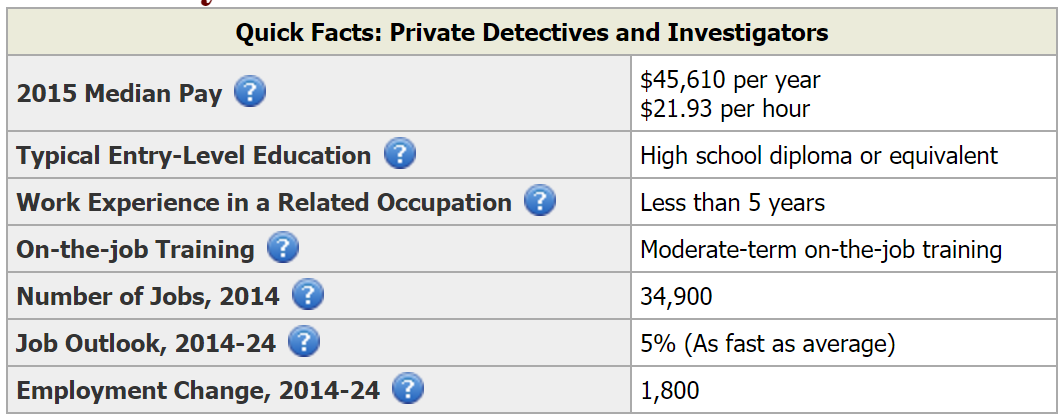

Table Of Contents
- Average Detective Salary
- Detective Career Outlook
- How To Become A Detective
- Detective Job Description
How Much a Detective Earns
The basis of a detective’s salary at first will depend on his or her employer. In most circumstances, a state employed investigator earns more than a private one. This is because a private detective has intermittent work while the state employed has a steady work. The national average that is earned by a detective who is employed by the state is $76,000. Whereas the average salary for a private detective can be around $45,000. We shall discuss factors affecting a PI’s salary later. Let’s take a look at the factors affecting a state employed investigators’ salary at the moment.
[asd_program_button /]Number of People
Like police officers, the population of a city decides the income of a detective. The number of cases to be handled by a detective increases if the city is more populated. Thus, the increase in salary. One of the major factors in deciding the salary of an investigator is the crime rate. For example, the average salary for someone in the LA police department ranges from $44,000 to $88,000. Whereas, a member of the Miami Police department usually get $86,000 to $107,000 salary.
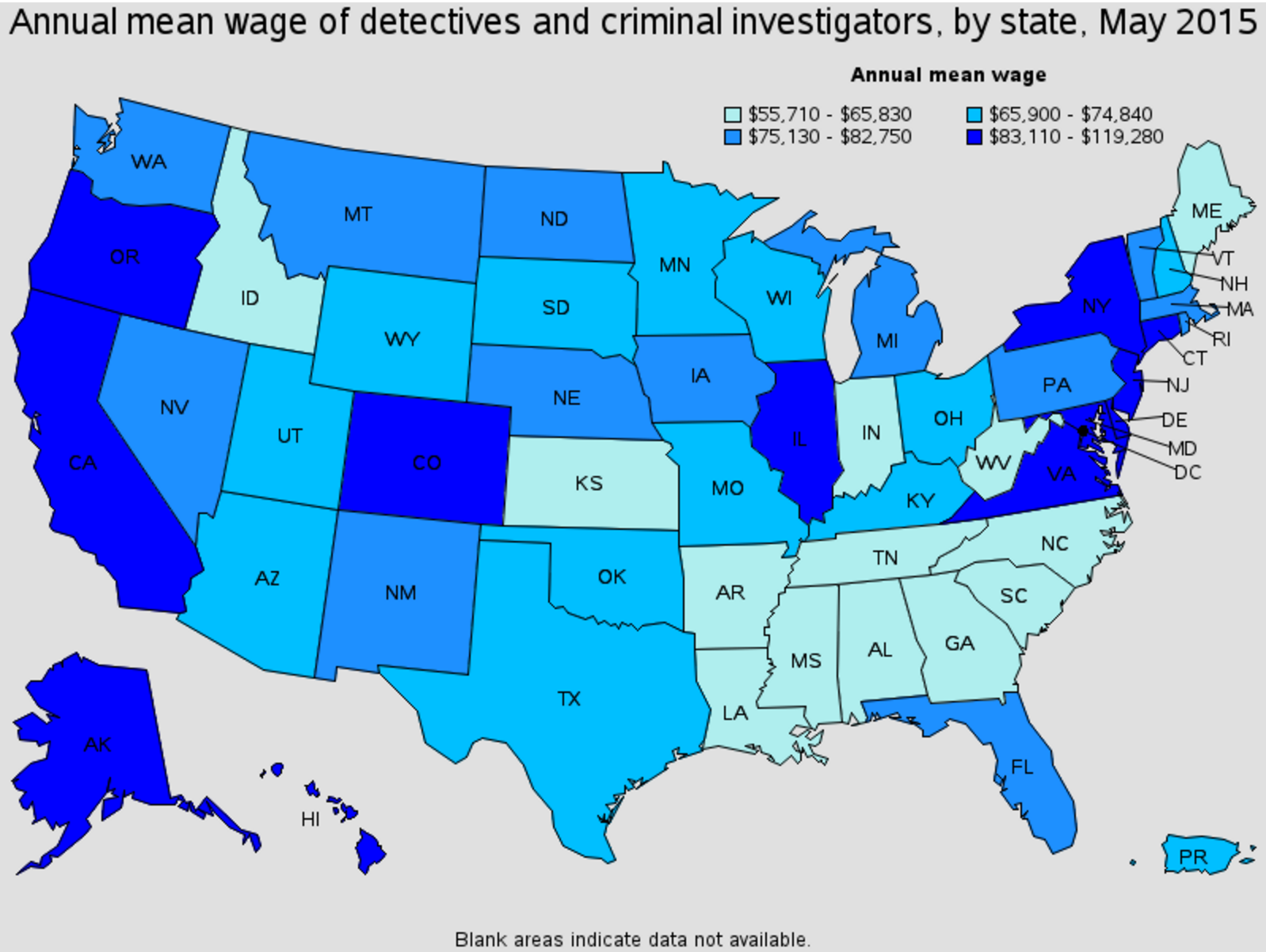
Place assigned or working
Crime rate and population of the place are closely related to the location. But there is another factor, which is the cost of living. A detective will be paid higher if the cost of living in that certain location is higher. Private investigators will also have this case. District of Columbia, Alaska, and New Jersey all pay 6-figure salaries with District of Columbia paying as much as $116,000.
Level of education attained
One can have a police job if he or she has a high school degree except at the federal level. Though this rules sometimes varies with state, most states do not require higher education certificates. However, officers and detectives are paid more if they have a degree after high school as there are states and departments who consider higher education important. The degree could be associate, bachelor or master’s. Depending on your degree, you might be paid more.
Experience
Like any other job, you will get earn as an investigator if you stay in the field long enough. Usually, people see an increase of up to $15,000 with 20 years of experience if they do not get promoted. However, with promotions, if you reach the post of Police Chief, you can earn about $180,000 annually.
Newfoundland Private Investigators
A private investigator’s salary depends on the number of cases he or she takes and solves. As mentioned before, the location can affect the price along with the many other factors such as the amount of discretion needed, the amount of danger involved, extra equipment required and many other things. The price for the job will be quoted by the investigator after the problem is presented by the clients.
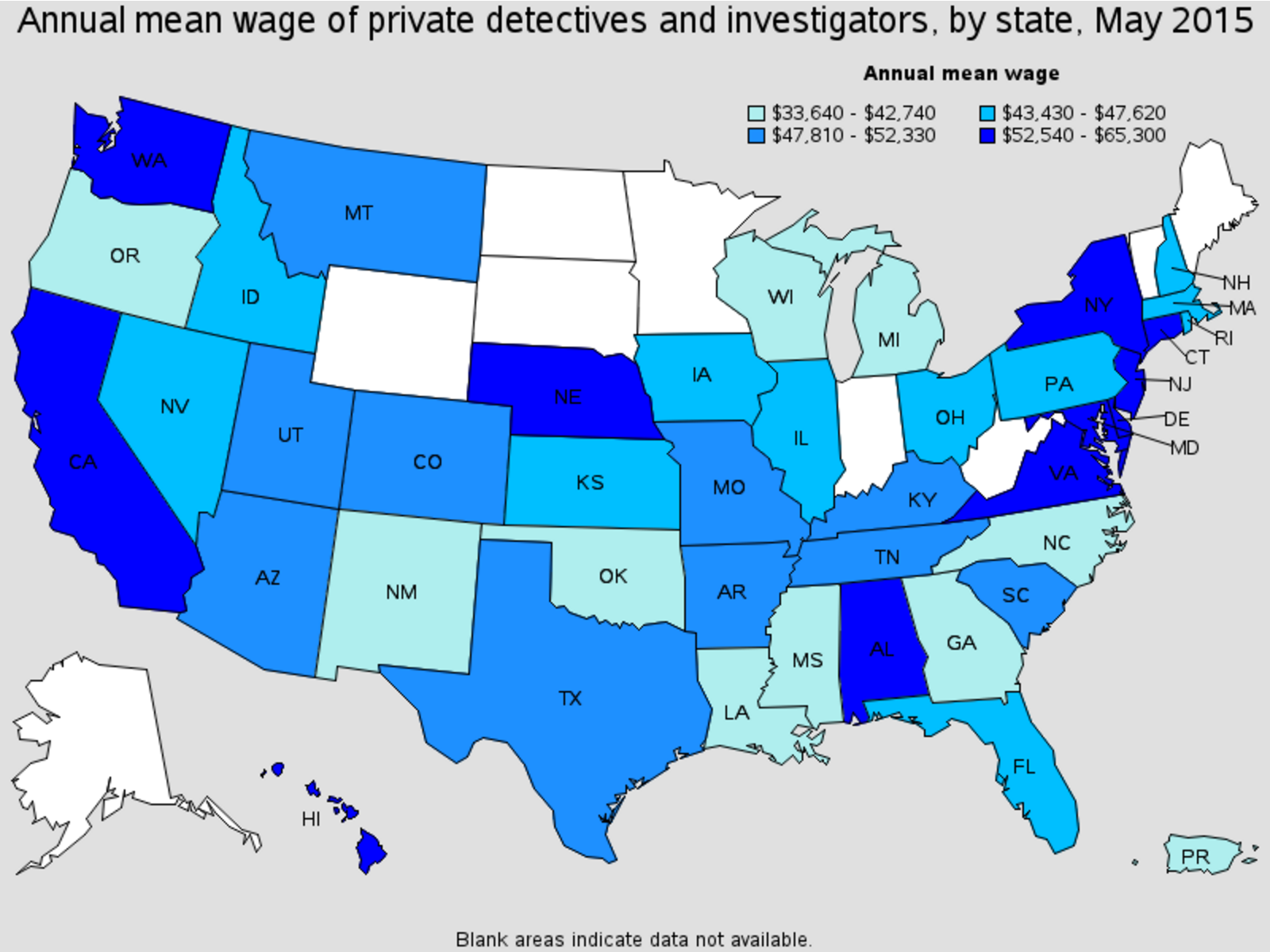
As you can see, the income of a state-employed detective is steady and can be increased by various means. On the other hand, a private investigator’s salary is quite unpredictable and will only increase if he or she is already popular or known. Based on these financial facts, you will be able to decide the path to go.
Career Outlook of a Newfoundland Detective
First, let’s talk about the growth in the fields. In 2015, the recorded public detectives or criminals investigators are about 106,000. On the other hand, there were only about 30,000 private investigators holding a job at the same time. There is a predicted growth of 5% in the industry of private detectives. Meaning to say, in 2025 the new jobs open will reach 1,500. This growth rate is following the average growth rate of 5% across all other sectors. This figure is only 4% for public investigators. This goes to show that 4,000 more jobs as a criminal investigator is expected in 2025. This too is an average rate of growth.
[asd_program_button /]The steady increase in employment is mainly due to the increase in population. As the population increases, more people need to be protected and more criminals need to be caught. However, with stricter laws and more advanced technology being use, the crime rate isn’t increasing that significantly. Thus, both the phenomena almost balance each other out leading to an average growth in both these careers.
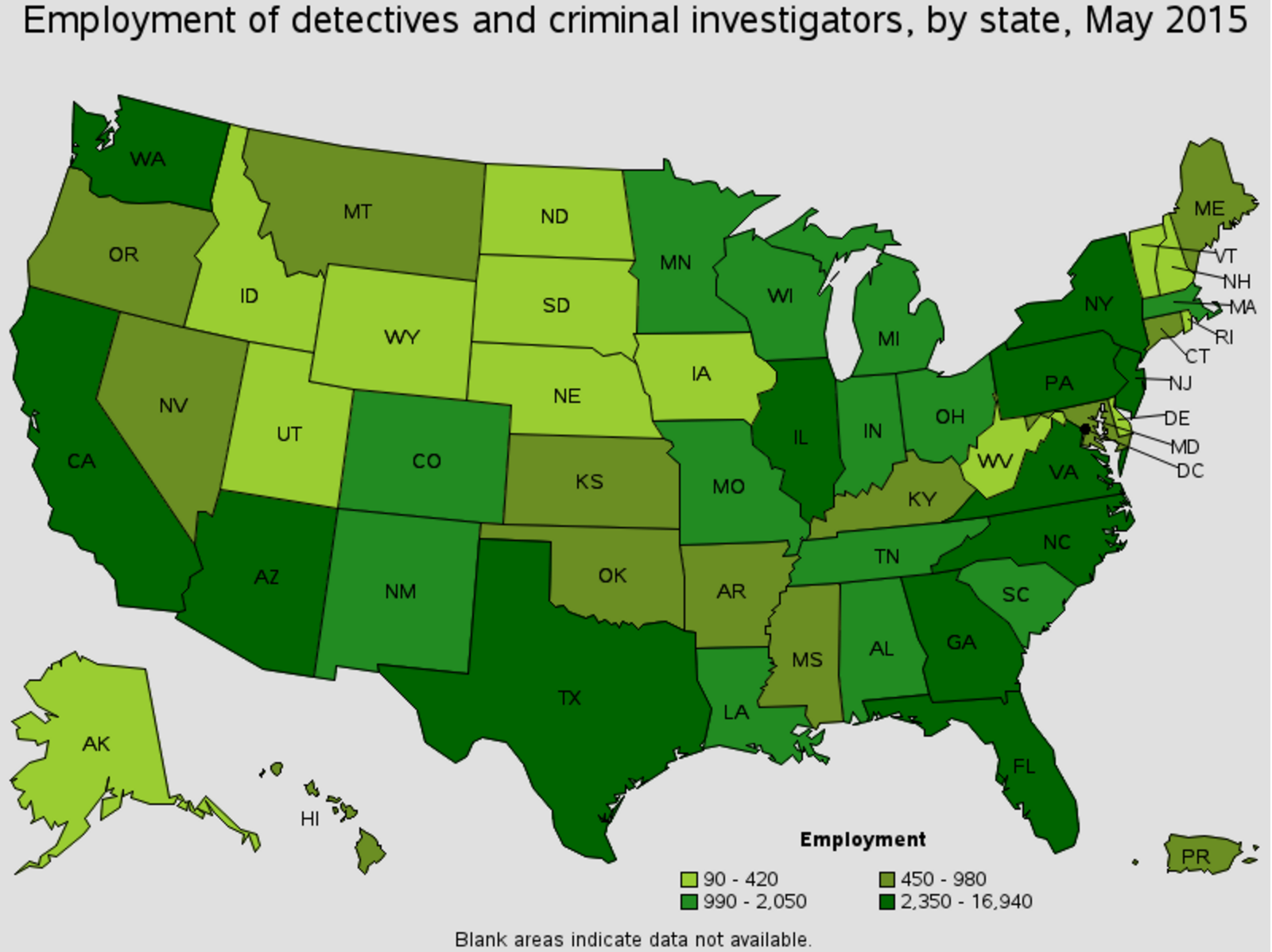
Geographically speaking, Texas, California and New York employ the highest number of Criminal / Law Enforcement Investigators. There are more employments in Western states and Texas compared to the eastern part. Private detectives are prominent in California, Texas and Florida with the southern states tending to employ more compared to the northern ones.
Let’s now find out where these two professionals are hired most by industires. As clear as day, The Local, State government and the Federal branch employ the most number of criminal investigators. Whereas private detectives are being hired by Security Services, Consulting services and the local government for consultation purposes on a few cases.
Criminal investigators get higher payments than the private ones. Criminal investigators receive $80,000 as average salary annually while Private investigators earn $52,000 only. Public investigators are paid most in District of Columbia, Alaska, and New Jersey in the aspects of geography and finance. Private detectives were paid most in Alabama, Nebraska, and New Jersey.
Comparing with different industries again, we see that for private industries, the most employing industries do not pay the highest. Private detectives are paid most in Electromedical, Navigational, Power generation, Metal Product forming and other such industries because of the most sensitive information that needs to be protected. Federal agencies, postal services, and educational institutes are paying public investigators most.
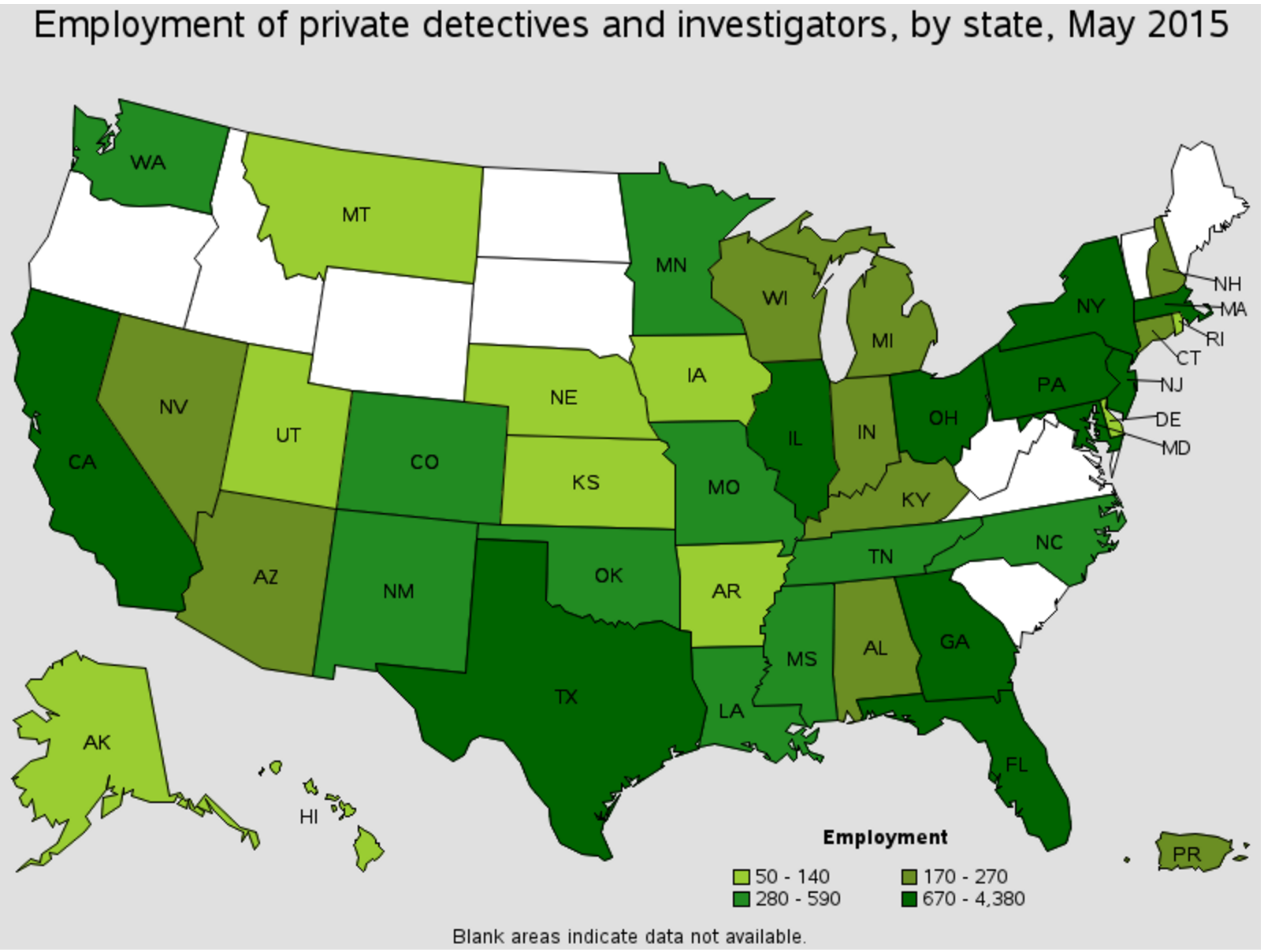
How To Become A Newfoundland Detective
Keep in mind that there are two kinds of detectives. There are private investigators that the general public can hire to investigate on certain things. Some of them are employed by the government and get this post after their promotion as a police officer. Here we shall explore both the avenues.
[asd_program_button /]Be a High School Graduate
Due to excellent deduction skills, a deductive is able to take a leap from a police officer to a detective position. This only means that you will need to complete your high school studies and become a police officer before you can become a detective. Becoming a private investigator would mean getting a high school degree.
Earn a Bachelor’s degree
A bachelor’s degree isn’t really necessary in most cases when becoming a police officer. Some officers however want to have another source of income right after they retire from their job. Likewise, you will need a bachelor degree if you want to become a detective.
Many institutions require applicants to have a bachelor’s degree in law, criminal justice or psychology to become a detective. Anyone with an associate’s degree is given training up to 5000 hours. However, the time required is reduced to 4000 hours if you have a bachelor’s degree.
Gain experience
Professional experience as an investigator is required in order to become a professional detective. There are many ways to get this. But in most cases, it will require you to be employed by the government. Landing work as a law enforcement investigator, arson investigator, or criminal investigator will count as being a person with experience. However, you can also choose to work as a licensed repossessor or office investigator.
There might be variations in the required experience in the state you’re applying in. Some states require you to have 3 years of experience while others require 5 years.
Get firearms permits
If an investigator doesn’t have a firearms permit, he won’t be allowed to carry his firearm. There are several firearms with strict requirements such as completing a full training course before the permits are issued. Hence, to get a permit for your firearm when working as an investigator, you will need to complete the full training course.
Undergo a New Jersey licensing test
A licensure test is required after you have all the requirements needed. During the exam, you will need to answer questions in multiple choice, usually regarding about state laws and several other procedures. The test is only available for those who want to be private detectives. After passing this test, you are officially a private investigator with a license.
File for New Jersey insurance
Being a detective is dangerous, hence it is a good idea to get your insurance. Basically, this is a medical insurance worth $10,000. However, getting an even higher amount when you bring a firearm is necessary since you need to have some protection with you.
Simply follow through all steps and you’ll have nothing to worry about. You can now start living the detective life you always wanted. However, don’t forget that being a detective would mean exposing yourself to danger. If you are still up for it, find out all the education requirements in detail and get started on them right away!
What Does A Detective Do In Newfoundland?
Crime Scene Investigation
One main role of a detective is to take a look at a crime scene and make certain deductions. He will then collect any evidence he can find in the crime scene. They will need to keep anything suspicious that might lead to solving the case. To help them deduce a lot of things more quickly and easily, the forensic department will sometimes offer them assistance. They are also supposed to go door to door and gather more evidence from eye witnesses or search for cameras wherever they might be installed.
[asd_program_button /]Criminal Research
Doing research regarding previous cases is regarded as an important aspect of a detective’s job. This is so that they can have an insight regarding criminal patterns and behaviors. Often, research into the past and previous case files give them an idea or a clue as to how the current culprit might be operating. This is really helpful when it comes to serial killers. This is also applicable when it comes to knowing what tactics a drug cartel is up to. Other general research can help them narrow down a suspect better or deduce the crime scene in a more efficient way.
Reducing the list of possible suspects
The goal of a detective’s job is to bring justice to light and bring the culprit to justice. However, they will need to come up with a list of suspects first. This suspect pool maybe as big as 100 people or as small as none. With the help of evidence, research, statements, and forensic studies, they are able to come up with such list. By means of getting statements from suspects, detectives are able to narrow down their list. After they narrow it down as much as possible, they collect hard evidence or get the suspect to confess to the crimes.
Testifying In Court
One of the final jobs of a detective on a case is to ensure that justice is served. To help with the process, they are sometimes summoned to the court to testify against the suspect(s). They either narrate a possible scenario of how the crime was committed, describe how the evidence incriminates the suspect or provide their expert views on certain topics. Sometimes, the detectives are also required to escort the culprit to jail.
Newfoundland Private Detectives
The above duties are what a detective is expected to do. The job description of a detective is a bit loose. They are supposed to carry out their client’s wishes to the best of their abilities as far as reconnaissance is concerned. However, they can only go as far as certain laws will allow them when going on with their job. A private detective is usually hired to perform background checks, keep a check on the actions of certain people, track finances, collect evidence against someone or work of similar nature. When carrying out duties as a detective, they should make sure not to look suspicious and act like a normal citizen. Detectives are also prohibited from arresting an individual.
As you can see, the “Idiot Box” was right for the most part. The thing is, the duties and roles detectives undertake every single day are very stressful. Such things aren’t even shown on the TV. Supposedly, they should carefully collect any clue and evidence since they carry such heavy responsibility on their shoulders. If you’re really interested with the job, you should start knowing what it takes to be a detective now!
